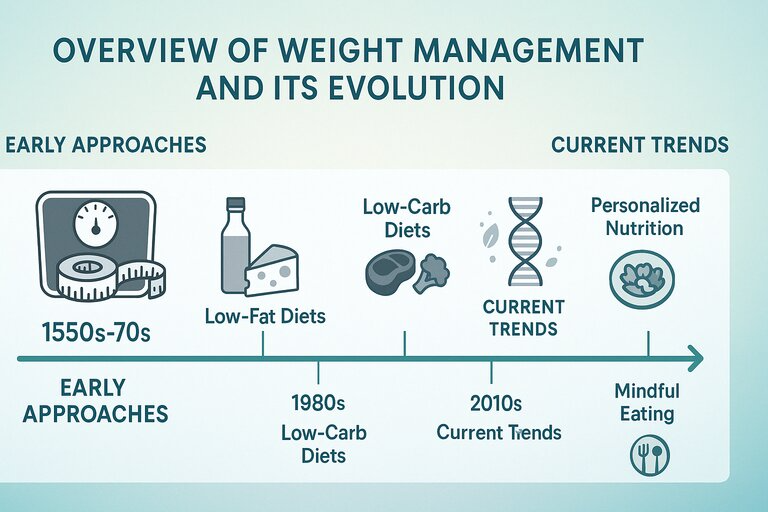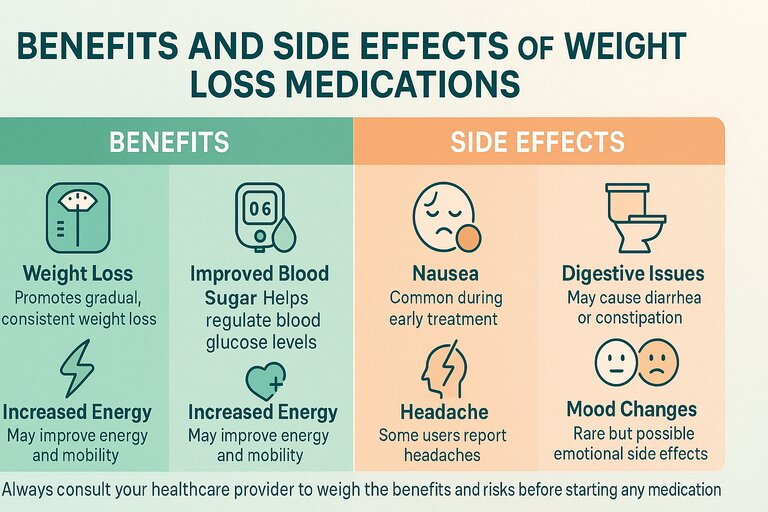
“The future of weight management isn't just about losing pounds; it's about redefining our relationship with health.”
This profound statement sets the stage for a transformative journey exploring groundbreaking trends, innovations, and strategies that promise to revolutionize how we approach wellness and sustainable weight control.
Overview of Weight Management and Its Evolution
Weight management has undergone significant transformations over the decades, shifting from rudimentary practices to sophisticated methodologies bolstered by technology and research.
Historically, the focus was primarily on caloric intake, with individuals often resorting to drastic diets and extreme physical activity.
As the medical community began to understand the complexities of weight regulation, the narrative shifted towards a multifaceted approach, incorporating behavioral modifications, environmental considerations, and biological factors.
Today, the emphasis is placed on sustainable lifestyle changes complemented by medical interventions like GLP-1 medications, which have emerged as a promising tool in the battle against obesity.

Understanding the Future of Weight Management
The future of weight management is poised to emphasize personalized health strategies that cater to individual needs, combining both medical solutions and lifestyle modifications.
With advancements in technology and more sophisticated understanding of human biology, we are entering an era where weight management is not merely seen as a diet fad, but an integral part of a holistic health system.
Experts anticipate that the integration of artificial intelligence and machine learning will allow for sharply tailored weight management solutions.
People will benefit from apps that analyze their eating habits, suggest healthier replacements, and encourage regular physical activity based on real-time data.
The Role of GLP-1 Medications in Weight Loss
GLP-1 medications like Ozempic and Wegovy are changing the landscape of obesity treatments. These medications work by amplifying the body's natural appetite-regulating hormones, leading to reduced hunger and prolonged satiety.
As Dr. Jim Hill states, "The future of weight management isn't just about losing pounds; it's about redefining our relationship with health."
These injections not only facilitate weight loss but also provide additional benefits, including improvements in cardiovascular health, reduced risks of Type 2 diabetes, and enhanced overall quality of life.
For more insights on cardiovascular health, you might find it interesting to explore how coffee can impact heart disease risk .

The Science Behind Weight Loss Medications
Understanding the mechanisms behind GLP-1 medications is crucial in appreciating their impact. GLP-1 (glucagon-like peptide 1) works by signaling the brain regarding fullness, thus helping individuals reduce caloric intake without the discomfort of persistent hunger.
As these medications become more prominent in weight management, comprehending their functionality becomes essential for both healthcare providers and patients alike.
How GLP-1s Work: Mechanisms of Action
GLP-1 medications mimic the action of incretin hormones that are normally released after eating. They enhance insulin secretion, inhibit glucagon release, and slow gastric emptying, leading to significant reductions in food intake and body weight.
With these pharmacological agents, patients experience a decrease in cravings and increased control over their eating behaviors, fostering a sustainable weight management approach.

Benefits and Side Effects of Weight Loss Medications
While GLP-1 medications are effective for weight loss, understanding their benefits and potential side effects is crucial. Benefits may include significant weight loss, improved metabolic health, and an overall better quality of life.
However, possible side effects can involve gastrointestinal issues like nausea and vomiting, alongside the need for proper dietary adjustments to mitigate these effects.

Long-Term Weight Management Strategies
Sustainable weight management requires a multifaceted approach that merges physical activity, balanced nutrition, and behavioral interventions.
While GLP-1s offer a pathway to weight reduction, their efficacy hinges on a commitment to lifestyle changes that reinforce the weight loss achieved.
The Importance of Lifestyle Changes
To maintain long-term weight loss, individuals must incorporate consistent, healthy practices into their daily lives. This involves not only regular physical activity but also mindful eating habits that prioritize nutrition.
Studies indicate that lifestyle modifications, including establishing a routine of exercise and focusing on whole foods, are vital for sustainable weight management. For those interested in enhancing their physical activity, consider exploring simple exercises to improve leg circulation .

Mindset and Identity in Weight Management
A significant aspect of successful weight management is the mental shift that individuals must undergo. Embracing a new identity that reflects one’s health goals can facilitate long-term adherence to healthy behaviors.
Individuals must see themselves as part of a healthier lifestyle, which in turn can affect their commitment to fitness and nutrition.

Expert Insights on Weight Management
Dr. Jim Hill's Perspective on Weight Loss Medications
Dr. Jim Hill emphasizes that the future of weight management involves a comprehensive understanding of both physical and psychological factors. His extensive research shows that medication is an addition to, rather than a replacement for, traditional weight management strategies.
"The future of weight management isn't just about losing pounds; it's about redefining our relationship with health." — Dr. Jim Hill
The Role of Dietitians in Weight Management
Dietitians play a crucial role in weight management, providing personalized guidance and support. They help patients navigate their dietary restrictions while encouraging sustainable lifestyle choices.
Those embarking on weight loss journeys—especially with medications—should routinely engage with dietitians to ensure nutritional adequacy throughout their progress.

Challenges and Considerations in Weight Management
The pathway to effective weight management faces numerous challenges, including accessibility of medications and the financial implications tied to ongoing usage.
Understanding these barriers is essential for patients looking to optimize their weight management journey.
Access and Affordability of Weight Loss Medications
Despite the promising benefits of GLP-1 medications, many face challenges accessing them due to high costs and insurance coverage limitations.
As the popularity of these drugs has grown, demands for availability have surged, complicating the landscape further.
Potential Risks and Concerns with Weight Loss Drugs
Concerns surrounding the potential risks associated with weight loss medications must be carefully addressed.
Patients should be aware of possible side effects and work closely with healthcare providers to monitor their health throughout the usage of such drugs. This collaboration is essential for mitigating risks while maximizing benefits.

People Also Ask
What is the future of obesity treatment?
The future of obesity treatment is expected to incorporate advanced pharmacological interventions like GLP-1 medications combined with lifestyle changes for lasting results.
What is the new weight loss drug in 2025?
New weight loss medications continue to emerge, with many focusing on enhancing satiety and reducing cravings, integrating technological advancements for better patient outcomes.
What is the most successful weight management technique?
Successful weight management techniques often involve personalized approaches that combine dietary changes, physical activity, and medical interventions tailored to individual needs.
What is the future of GLP-1?
The future of GLP-1 medications looks promising as ongoing research and clinical trials uncover their full potential in both weight management and the treatment of obesity-related conditions.
Conclusion and Key Takeaways
As highlighted throughout this exploration, the future of weight management is not solely about losing weight; it is about cultivating a lifestyle that promotes overall health and well-being.
Individuals interested in sustainable weight loss must emphasize lifestyle changes, embrace effective medications like GLP-1s, and work with health professionals to achieve their goals.
"If you want to change your weight permanently, you change your life permanently." — Dr. Jim Hill
Call to Action
Explore more about weight management strategies and stay updated on the latest research.
Curious about how better nutrition can boost your energy and focus? Visit our Nutrition Guide for easy-to-understand wellness tips, and explore more topics on Sacramento Living Well. ---
Authored by the Sacramento Living Well Editorial Team — a publication of DSA Digital Media, dedicated to highlighting wellness, local living, and inspiring community stories throughout Greater Sacramento.
 Add Row
Add Row  Add
Add 





Write A Comment